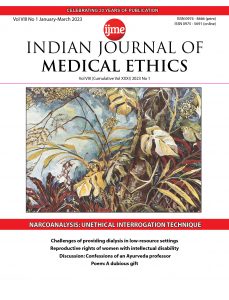
As we campaign against the increasing cases of human rights violation in detention, we view with dismay the expanded use of medical technologies for investigation. An editorial in this issue focuses on unscientific and unethical methods of interrogation.
An Ayurveda professor’s reflections on the need to critically revise the Ayurveda curriculum triggered strong responses from our readers. We have carried some of these responses in the journal to stimulate a constructive discussion on this subject.
A research article analyses the barriers to and facilitators of professional autonomy in nursing. Another study explores the effectiveness of teaching medical ethics to students on a virtual platform.
Is “free-of-charge” dialysis really free? And does affordability affect decisionmaking? A study and a comment analyse the respective issues, while an editorial comments on both. In another comment, an author elaborates on the central ideas from the book “The Dravidian Model” to better understand the effectiveness of the “Tamil Nadu model” of healthcare in India.
A student reflects on delivering care on the Covid-19 frontline, a short poem describes the nature of gift authorship, and a letter emphasises the need for regulation of yoga and naturopathic medicine in India in this issue.
We thank all our readers and contributors for their support to the journal over the past 30 years and wish them a peaceful and healthy 2023.
__________________________________________________________________________________________________________
Cover credit: Wild orchids and monstera leaves by Perveen Tayabali
